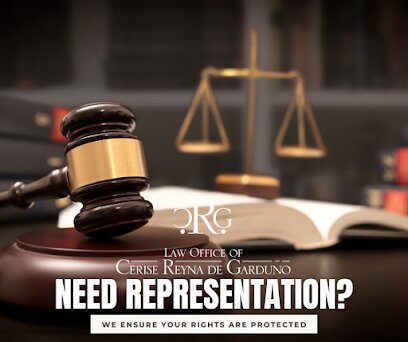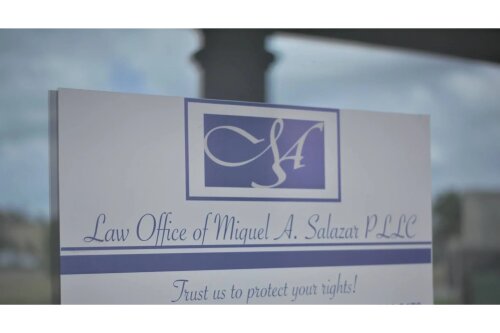Best Child Abuse Lawyers in Brownsville
Share your needs with us, get contacted by law firms.
Free. Takes 2 min.
Free Guide to Hiring a Family Lawyer
List of the best lawyers in Brownsville, United States
About Child Abuse Law in Brownsville, United States
Child abuse law in Brownsville, Texas, falls under state child-protection and criminal statutes, and it is enforced locally by Texas agencies and Cameron County authorities. These laws are designed to protect children from physical abuse, sexual abuse, emotional abuse, and neglect. When abuse is suspected, state child-protective services and local law enforcement may investigate, medical providers may treat and document injuries, and prosecutors may pursue criminal charges when warranted. Separate civil proceedings in family or child-protection courts can determine custody, temporary removal, reunification requirements, or termination of parental rights.
Why You May Need a Lawyer
Child-abuse matters often involve high stakes and multiple legal processes at once. You may need a lawyer if:
- You are a parent or caregiver whose child has been removed from home and you need representation in child-protection or family court hearings.
- You are accused of committing abuse or neglect and face criminal investigation or prosecution.
- You represent a child who is a victim and need counsel for civil claims, participation in hearings, or to protect the child’s rights.
- You need to challenge or comply with a DFPS (Texas Department of Family and Protective Services) case plan or seek reunification services.
- You are involved in related issues such as custody disputes, guardianship petitions, adoption cases following foster care, or appeals of court orders.
A lawyer with experience in child welfare law, criminal defense, or family law can explain legal options, represent you at hearings, help preserve evidence, negotiate with prosecutors or DFPS, and pursue parallel civil remedies where appropriate.
Local Laws Overview
Key aspects of local and Texas state law that are particularly relevant in Brownsville include:
- Definitions and scope - A child is generally anyone under 18. Abuse and neglect include physical injury, sexual abuse or exploitation, serious emotional injury, and failure to provide adequate care.
- Reporting - Certain professionals are mandatory reporters and must report suspected abuse to DFPS or local law enforcement. Any member of the public may also report suspected abuse.
- Investigations - DFPS conducts investigations of abuse and neglect reports. Law enforcement may investigate criminal allegations at the same time. Investigations can include interviews, home visits, medical exams, and collection of evidence.
- Emergency removal - If a child is believed to be in immediate danger, law enforcement or DFPS may remove the child from the home temporarily. State law provides procedures to seek emergency court orders and a prompt judicial review of such removals.
- Court standards and proceedings - Civil child-protection proceedings use different standards than criminal cases. In termination of parental rights cases, Texas courts require clear and convincing evidence. Criminal cases require proof beyond a reasonable doubt.
- Parental rights and appointed counsel - Parents facing termination or certain protective hearings have rights to notice and to legal representation. If a parent cannot afford counsel in certain proceedings, the court may appoint an attorney.
- Criminal penalties - Criminal charges for child abuse, sexual offenses, or related crimes are prosecuted under the Texas Penal Code and can carry severe penalties if convicted. Separate civil remedies may also be available to victims and families.
Frequently Asked Questions
What exactly counts as child abuse in Brownsville?
Child abuse includes physical harm or risk of harm, sexual abuse or exploitation, serious emotional injury, and neglect such as failing to provide food, shelter, medical care, or appropriate supervision. Texas statutes and DFPS guidance define specific conduct that qualifies as abuse or neglect.
How do I report suspected child abuse?
You can report suspected abuse to the Texas Department of Family and Protective Services or local law enforcement. If a child is in immediate danger, call 911. Reports can come from anyone - professionals like teachers and doctors are mandatory reporters and have legal obligations to report.
What should I expect during a DFPS investigation?
DFPS or law enforcement may visit your home, interview the child and adults, request medical exams, and gather records. Interviews are typically private and may occur at the child’s school or at an office. Cooperate but be mindful of your rights - if you are a subject of the investigation, consider consulting an attorney before making detailed statements.
Can my child be removed from my home? For how long?
Yes. If authorities determine the child is in immediate danger, the child can be removed and placed with a relative, foster family, or another safe setting. Emergency removal is temporary; DFPS must seek court oversight and the court will hold hearings to review removal, services, and possible reunification or longer-term arrangements.
Do I have to let investigators into my home?
If investigators have a warrant or a court order, you must comply. If they do not have a warrant, you may ask the investigators to obtain one. Be careful about refusing emergency-care needs for a child - if the child is in danger, law enforcement or DFPS can act quickly. When in doubt, consult a lawyer.
What if I am accused of abusing a child I care for?
Being accused can lead to criminal charges and child-protection cases. Protect your rights - do not give detailed statements without legal advice, preserve any evidence that might show your innocence, and contact an attorney experienced in criminal defense and child-welfare matters immediately.
Can a child abuse allegation affect custody in other family law matters?
Yes. Allegations can influence custody, visitation, and child-support proceedings. Family courts consider child safety as a primary factor. Even unproven allegations can complicate or delay custody resolutions until the allegations are investigated and resolved.
What is the difference between criminal prosecution and DFPS civil proceedings?
Criminal prosecution is handled by the district attorney and seeks to punish wrongdoing under the Penal Code, requiring proof beyond a reasonable doubt. DFPS civil proceedings focus on the child’s safety and welfare and can result in removal, court-ordered services, or termination of parental rights, often using lower evidence standards like clear and convincing in TPR cases.
How can I protect my child and preserve evidence?
For immediate safety, remove the child from the situation and seek medical help if needed. Preserve clothing, devices, messages, photos, and medical records. Write down dates, times, and names of witnesses. Limit washing or changing anything relevant to a physical exam until medical professionals advise you.
Where can I get free or low-cost legal help in Brownsville?
There are nonprofit legal-aid organizations and victim-advocacy groups that may provide free or low-cost assistance, and courts can appoint counsel to eligible parents or children in certain proceedings. Contact local legal aid groups, the county court system, or a state bar referral service to find lawyers experienced in child-welfare cases.
Additional Resources
When seeking help for child abuse matters in Brownsville, consider these categories of resources - contact the appropriate local office in your area:
- State child-protective agency - Texas Department of Family and Protective Services (DFPS) handles reports and investigations of child abuse and neglect.
- Local law enforcement - Brownsville Police Department and Cameron County Sheriff for immediate threats and criminal investigations.
- County prosecutors - Cameron County District Attorney’s Office prosecutes criminal child-abuse cases and can provide victim services information.
- Child advocacy centers and victim services - organizations that provide forensic interviews, medical exams, counseling, and support for children and families.
- Medical providers and hospitals - emergency rooms and pediatricians can document injuries and provide necessary care.
- Legal aid and nonprofit lawyers - programs that offer free or reduced-fee legal representation for low-income residents in family and child-welfare cases.
- Court-based resources - family-court clerks and court-appointed attorneys or guardians ad litem who represent children in protective proceedings.
- Professional licensing boards - if the suspected abuser is a professional, licensing boards may investigate and discipline practitioners.
Next Steps
If you suspect child abuse or are facing child-abuse allegations, take these practical steps:
- If the child is in immediate danger, call 911 right away.
- Seek medical attention if there are injuries - medical records are important evidence and protect the child’s health.
- Report suspected abuse to DFPS or local law enforcement if it has not already been reported.
- Preserve evidence - keep clothing, messages, photos, medical records, and a written timeline of relevant events.
- Limit what you say to investigators until you have spoken with a lawyer if you are a subject of an investigation. If you are a nonaccused reporter seeking to protect a child, cooperate with investigators.
- Contact an attorney with experience in child-welfare law or criminal defense as soon as possible to understand your rights and options. If you cannot afford an attorney, ask the court about appointed counsel or reach out to local legal-aid organizations.
- Engage available support services for the child and family - counseling, emergency shelter, or victim advocacy can be crucial while legal matters are pending.
Remember, this guide is informational and does not replace legal advice. For personalized guidance and representation, speak with a qualified attorney who is licensed in Texas and familiar with child-welfare and criminal procedures in Brownsville and Cameron County.
Lawzana helps you find the best lawyers and law firms in Brownsville through a curated and pre-screened list of qualified legal professionals. Our platform offers rankings and detailed profiles of attorneys and law firms, allowing you to compare based on practice areas, including Child Abuse, experience, and client feedback.
Each profile includes a description of the firm's areas of practice, client reviews, team members and partners, year of establishment, spoken languages, office locations, contact information, social media presence, and any published articles or resources. Most firms on our platform speak English and are experienced in both local and international legal matters.
Get a quote from top-rated law firms in Brownsville, United States — quickly, securely, and without unnecessary hassle.
Disclaimer:
The information provided on this page is for general informational purposes only and does not constitute legal advice. While we strive to ensure the accuracy and relevance of the content, legal information may change over time, and interpretations of the law can vary. You should always consult with a qualified legal professional for advice specific to your situation.
We disclaim all liability for actions taken or not taken based on the content of this page. If you believe any information is incorrect or outdated, please contact us, and we will review and update it where appropriate.










